Welcome to the BNE Blog – Your Trusted Source for Concrete Flooring Insights!
At BNE Concrete Floors & Coatings, we're more than just experts in concrete flooring solutions; we're enthusiasts who are passionate about sharing our knowledge and experience.
Our blog features the latest industry news, concrete solutions for various industries, and essential tips for maintaining your concrete floors.
Whether you're exploring flooring options for industrial use, seeking stylish and sustainable polished concrete solutions, or looking for maintenance advice, our blog is your guide! Join us in exploring the sophisticated and practical world of concrete flooring.
Each tag category in our blog is designed to guide, inform, and inspire you about the endless possibilities of concrete flooring.
You can navigate our blog with the blog tags below:
Concrete Industry News: Stay updated with the latest trends and developments. We provide insights into new technologies, market trends, sustainability initiatives, and regulatory changes impacting the concrete industry.
Industry Specific: We dive into how concrete solutions uniquely benefit various sectors like grocery stores, automotive facilities, and healthcare institutions. Learn about tailored flooring needs, durability demands, and aesthetic considerations for each industry, and how concrete flooring meets these specific requirements with efficiency and style.
Concrete Maintenance/Repair Tips: Gain insights on how to effectively preserve and care for your concrete surfaces. Learn about cleaning techniques, repair strategies, and preventative measures to extend the lifespan and appearance of your concrete flooring, ensuring it remains durable and visually appealing for years to come.
Epoxy Floor Coatings: Learn how these durable, chemical-resistant coatings are ideal for various applications, from industrial and commercial spaces to stylish residential areas, offering easy maintenance and a range of aesthetic options.
Polished Concrete Floors: Discover how this sleek, modern flooring option not only enhances the aesthetic of any space but also offers durability, low maintenance, and eco-friendliness. Ideal for various settings from homes to high-traffic commercial areas, polished concrete floors are a versatile choice that melds style with functionality.

According to the Centers for Disease Control and Prevention (CDC), on any given day in the United States, about one in 31 hospital patients contracts a healthcare-associated infection (HAI). In Canada, the statistic is 1 in 9 patients, according to the Provincial Infection Control Network of British Columbia (PICNet). HAIs are infections that patients get while receiving treatment for separate medical or surgical conditions that initially brought them in.
These numbers are alarming.
Ensuring the utmost cleanliness and hygiene standards within hospitals and healthcare establishments is an absolute imperative. The health and safety of patients, staff, and visitors are dependent on an environment free of contaminants and pathogens.
Beyond aesthetics, clean floors play a pivotal role in eliminating cross-contamination, safeguarding immunocompromised patients, and ensuring the safety of the healthcare ecosystem. Epoxy coatings, characterized by their seamless and impermeable nature, create an unwelcoming environment for germ spread.
Their resistance to chemicals enables the utilization of disinfectants without compromising the floor's structural integrity. Epoxy-coated floors provide remarkable durability, withstanding constant foot traffic, heavy machinery, and rigorous cleaning protocols existing in the healthcare industry.
In today’s blog post, we will share more information about epoxy floor coatings, maintenance and cleaning tips and lastly, factors to consider while implementing them.
At BNE, we are trusted experts in epoxy flooring. We have the knowledge, equipment, and skills to properly install concrete for any type of project. We use industry-leading technology and expertise to provide the client with a concrete structure that will last. Our clients seek us out because we are a single source in providing concrete finishing, polish and epoxy floor systems. This saves them time, money and the hassle of communicating their needs to various contractors. Do not hesitate to reach out to us for your next hospital or healthcare construction project. We are just one phone call or email away!
Before further exploring the relationship between epoxy floor coatings and healthcare facilities, let's take a moment to understand what epoxy floor coatings actually are.
Epoxy coatings are a type of high-performance surface finish that is created by mixing epoxy resin with a hardening agent. The resulting chemical reaction produces a tough, durable, and seamless layer that adheres tightly to the underlying concrete substrate. Epoxy coatings are known for their exceptional strength, resistance to chemicals and abrasion, and ability to provide a smooth, non-porous surface.
Epoxy floor coatings offer a range of distinct advantages that make them particularly well-suited for healthcare environments, where cleanliness and hygiene are all-time high concerns.
Epoxy-coated floors have gained immense popularity in healthcare environments not only for their durability and hygiene benefits but also for their remarkably easy maintenance and cleaning.

Here’s how:
Epoxy-coated floors feature a seamless and non-porous surface, leaving no room for dirt, liquids, or contaminants to penetrate or accumulate. This eliminates the need for labour-intensive scrubbing and extensive cleaning processes, as debris can be easily wiped or swept away.
Spills are a common occurrence in healthcare facilities, ranging from water and liquids to harsh chemicals. Epoxy coatings provide a protective barrier that prevents these substances from seeping into the flooring, allowing for quick cleanup without staining or damaging the floor's integrity.
Cleaning epoxy-coated floors involves simple wiping or mopping with mild cleaning solutions. The non-absorbent nature of epoxy prevents liquids from being absorbed, making cleanup swift and efficient.
Epoxy-coated floors are compatible with a wide range of disinfectants and cleaning agents commonly used in healthcare settings. The impermeable nature of the coating ensures that disinfectants effectively eliminate pathogens on the surface, contributing to infection control protocols.
Traditional flooring materials often require extended drying periods after cleaning, causing disruptions in healthcare operations. Epoxy-coated floors, on the other hand, have rapid drying times due to their non-absorbent nature.
Unlike some other flooring options that have joints or grout lines where dirt and microbes can accumulate, epoxy-coated floors provide a seamless and smooth surface.
Epoxy coatings are highly stain-resistant, meaning that even stubborn substances like ink, blood, or chemicals can be wiped away without leaving permanent marks.
Epoxy floor coatings align seamlessly with Canadian healthcare regulations, addressing infection control through their impermeable nature, which prevents the accumulation of pathogens and cross-contamination. They satisfy cleanability and sanitation standards with their smooth, non-absorbent surfaces, facilitating efficient cleaning and compliance with hygiene requirements.
Epoxy coatings' chemical resistance adheres to regulations that specify approved disinfectants, enabling effective sanitization without compromising floor integrity. The approval of the Canadian Standards Association (CSA) and adherence to Health Canada guidelines assure healthcare facilities of their adherence to recognized safety standards. Epoxy coatings also contribute to environmental sustainability, as low VOC options support Leadership in Energy and Environmental Design (LEED) certification aspirations for healthcare facilities prioritizing indoor air quality.
Choosing and implementing epoxy floor coatings in healthcare facilities requires careful consideration of various factors to ensure the effectiveness, longevity, and suitability of the flooring solution.
Here are a few to keep in mind:
We hope that by reading this blog post, you better understand how epoxy floor coatings promote hygiene and infection control in healthcare settings through their seamless, impermeable design that prevents contamination risks. These coatings stop moisture accumulation, mold growth, and bacterial proliferation, ensuring compliance with strict healthcare standards for patient safety and a sterile environment.

At BNE, we are trusted experts in concrete finishing. We have the knowledge, equipment, and skills to properly install concrete for any type of project. We use industry-leading technology and expertise to provide the client with a concrete structure that will last. Our clients seek us out because we are a single source in providing concrete finishing, polish and epoxy. This saves them time, money and the hassle of communicating their needs to various contractors. Do not hesitate to reach out to us for your next hospital or healthcare construction project. We are just one phone call or email away!
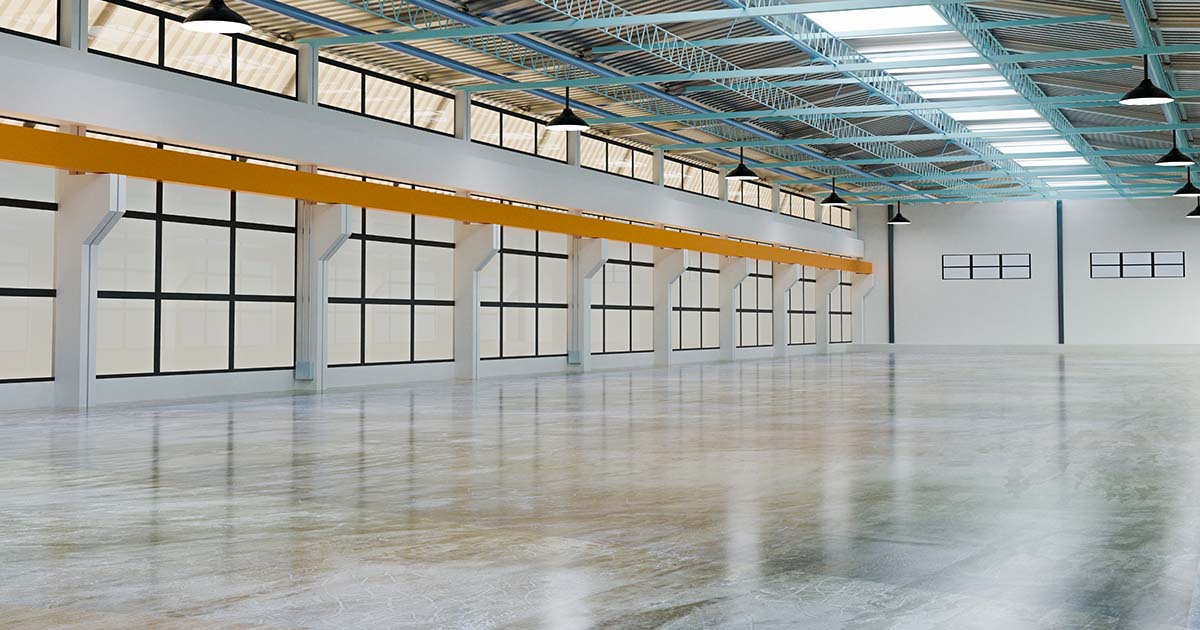
In our modern high-tech age, the way businesses operate have endured many changes. But one thing that remains the same, is the need for reliable warehouse space that facilitates the effective storage and transfer of goods. Ensuring that your company's warehouse has the kind of flooring that will hold up over time and endure heavy use can be a difference-maker for operational success.
Industrial concrete flooring offers a wide range of benefits that make it an excellent choice for warehouse settings, and addresses many of the problems that other types of warehouse floors experience. Concrete floors offer a lot of advantages in warehouses. There is also a wide selection of options available which can be ideal for warehouse upgrades and renovations.
Warehouses with non-concrete flooring such as vinyl, tile, or wood, often face issues with durability and longevity. These materials may not withstand the heavy loads, frequent forklift traffic, and constant wear and tear of daily operations. In contrast, concrete floors in industrial warehouses provide a robust and economical solution. Its long-lasting composition and low maintenance requirements make it an ideal choice for companies looking for high-performance flooring without breaking the bank.
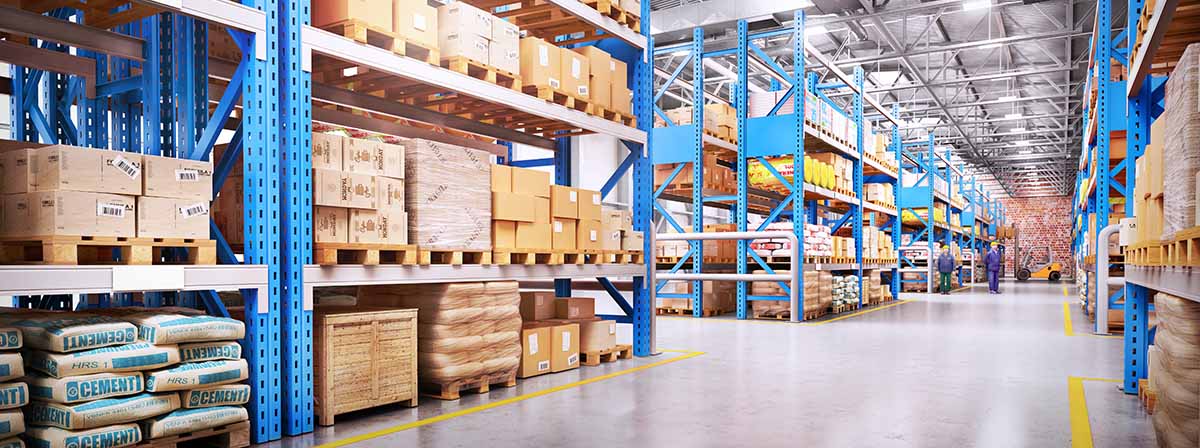
Typical non-concrete warehouse floors, especially those with smooth finishes, are more prone to slips and falls, posing a significant risk to worker safety. Industrial concrete flooring addresses this issue with options such as slip-resistant coatings and epoxy flooring, reducing the risk of accidents and ensuring a safer environment for employees. These types of coatings not only provide a more secure footing for workers, but also protect floors from damage and lengthen their lifespan.
Other types of flooring in a warehouse setting such as wood or laminate can be susceptible to damage from heavy machinery and equipment. Industrial concrete flooring is designed to withstand the impacts and weight of these heavy-duty operations. By investing in impact-resistant flooring such as concrete, you'll reduce the risk of damage to your floors and the costs associated with repairs or replacements.
In warehouses where hazardous materials are handled, some flooring types such as vinyl or rubber may not offer sufficient protection against damage or staining. For pharmaceutical companies, chemicals and drugs can corrode or degrade non-concrete floors. Cold storage facilities require floors that can withstand extreme temperatures and regular use of cleaning materials.
Other warehouse settings where anything from oil to batteries to fertilizer are stored can all experience damage to their floors if they're not designed to resist those substances. Industrial concrete flooring, combined with chemical-resistant coatings and sealers, offers protection against hazardous material damage. This makes concrete an excellent choice for pharmaceutical flooring, cold storage flooring, and other specialized warehouse environments.
One way for businesses to reduce their environmental footprint is through their choice of warehouse flooring, as certain non-concrete flooring materials can have a negative environmental impact. For example, some varieties of PVC tiles (polyvinyl chloride tiles) are known to release volatile gases that create air pollutants. A polished concrete floor has no such issue. It reduces dust accumulation in warehouse environments, and it's also mold resistant. Additionally, concrete is made from readily available and abundant raw materials, which make it a sustainable flooring option for eco-minded warehouses.
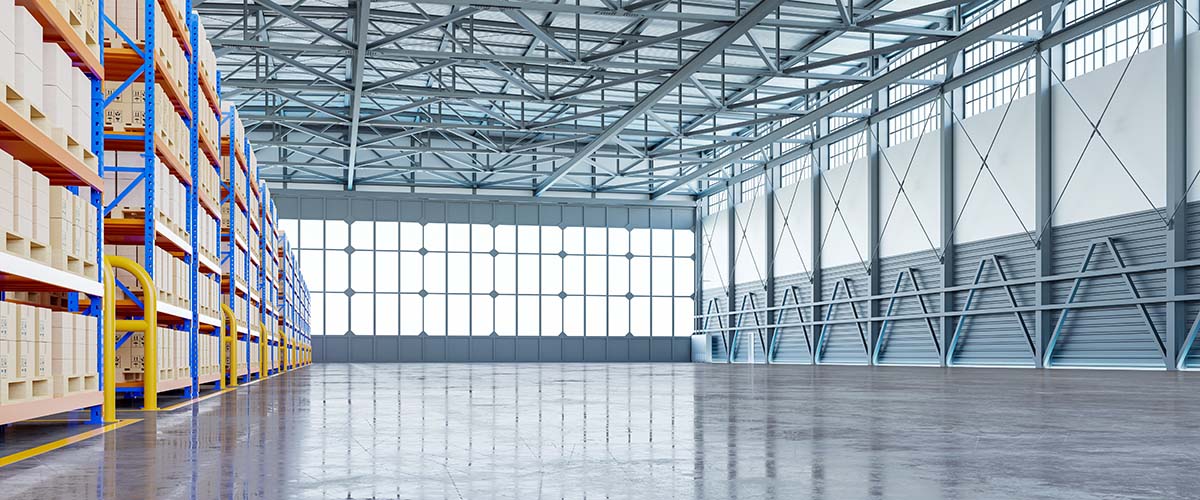
Not to be forgotten in the list of concrete floor benefits is its ease of cleaning. Polished concrete floors don't harbour dirt, dust, or allergens. This reduces the need for more frequent sweeping or vacuuming, saving both time and labour. Additionally, polished concrete floors can be easily washed or mopped and don't require any specialized cleaning products or techniques to remove stains or grime that might cause damage to the floor. This ease of cleaning contributes to a healthier and more hygienic workspace in the warehouse.
Another big advantage that concrete has as a warehouse flooring option is its ability to achieve exceptional levelling through precise laying techniques. Other types of flooring, such as wood, laminate, or tile, can be susceptible to warping, buckling, or inconsistencies in the subfloor. This results in an uneven surface that can pose challenges for material handling equipment like forklifts and pallet jacks, potentially causing operational delays or safety issues. Industrial concrete floors have a greater resistance against irregularities, ensuring smooth and efficient operation of machinery and equipment. This consistency also allows for more accurate placement of storage systems and optimizes space utilization within the warehouse. Concrete's capacity to deliver a flat and reliable surface make it a superior choice for warehouse flooring.
Among the many benefits of industrial flooring, concrete has an array of options to make your warehouse design modern and appealing. The traditional concrete look with basic epoxy coatings is just the starting point. With advances in concrete floor design, a wide range of decorative concrete like stained or stamped varieties are also available. This ensures that your warehouse not only benefits from a highly functional and durable flooring solution, but it also allows businesses to bring an aesthetically pleasing look to their warehouses as well.
If you're planning to renovate or upgrade your warehouse, non-concrete flooring choices can involve other challenges like the need for extensive subfloor preparation or complex installation processes. In contrast, industrial concrete flooring offers versatility and ease of installation, making it an excellent choice for a wide range of applications. Whether you're replacing an old floor or starting from scratch, concrete floor installation is a cost-effective and efficient option for your warehouse upgrades.
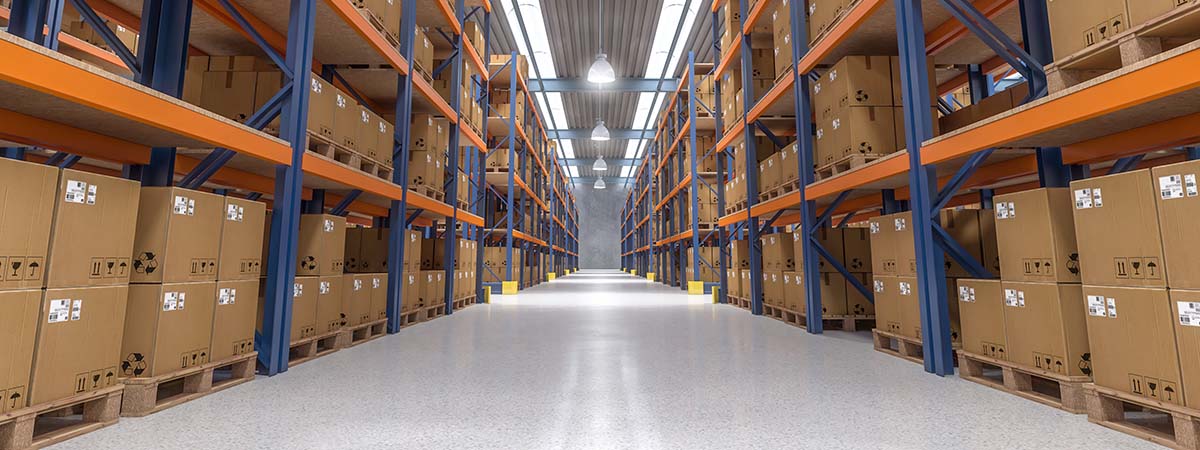
Some types of warehouse flooring require regular refinishing or reapplication of coatings, which can be time-consuming and costly. Industrial concrete flooring offers a selection of durable, long-lasting coatings and finishes to suit your specific needs. Epoxy flooring is resistant to wear, impacts, and chemicals, while polished concrete offers a smooth, low maintenance flooring finish that is easy to clean. Applying quality concrete sealers help to maintain the desired appearance and finish of your flooring for years to come. Certain coatings can also improve the ambient lighting conditions within a warehouse. High-gloss finishes can increase the floor's reflectivity and enhance the overall lighting efficiency. This not only contributes to a safer working environment but can also reduce energy costs by decreasing the need for additional lighting.
Depending on the industry, your warehouse may have unique flooring requirements that other flooring materials struggle to accommodate. By working with experienced professionals like BNE Concrete Floors, you can customize your industrial flooring solutions to meet your specific needs. For example, pharmaceutical flooring may necessitate a higher degree of cleanliness and chemical resistance, while cold storage flooring may need to withstand temperature fluctuations without cracking or degrading. For improved resistance to heavy loads, impact, and abrasion, higher concrete density options can be implemented. By tailoring your flooring solution to your warehouse's unique requirements, you'll optimize both functionality and efficiency.
When considering the type of floor to put in your warehouse, industrial concrete flooring is an all-round solid choice. Whether it’s for a new build, a warehouse renovation, or an upgrade, the many benefits of industrial flooring will ensure that your facility is equipped to handle the demands of today's fast-paced world. With its ability to improve warehouse safety, reduce floor maintenance, and incorporate the customization needs of your business, industrial concrete flooring is both a reliable and versatile solution, and a wise investment for any warehouse environment.
With BNE Concrete Floors, you'll have the right professionals by your side to create a warehouse environment that meets the unique demands of your company while ensuring the longevity and performance of your flooring for years to come.
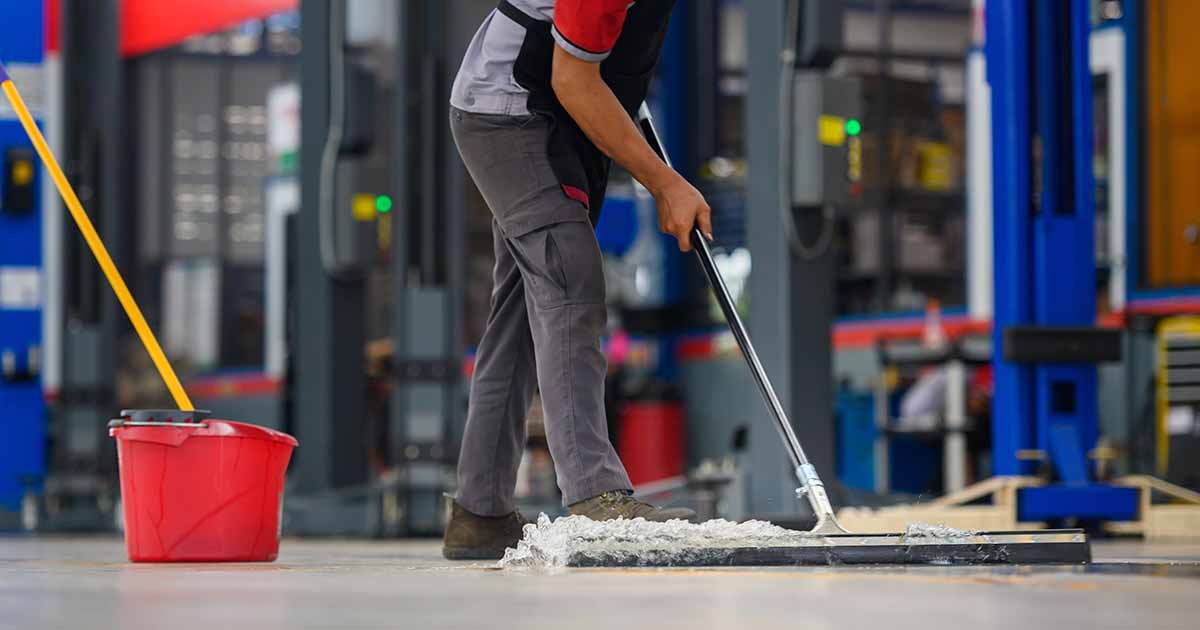
With its superior durability, low-maintenance requirements, and attractive appearance, polished concrete is a top choice for commercial flooring in retail stores, warehouses, showrooms, event venues, and office buildings. When compared to other flooring solutions, polished concrete floors offer cost savings, resistance to heavy foot traffic, a long service life, and limited maintenance. These factors make polished concrete flooring a no-brainer for store and building owners seeking value and efficiency.
While polished concrete maintenance for commercial spaces is low, polished concrete care and cleaning are essential for maintaining your flooring’s protective coating and overall lustre. Failing to clean or maintain it regularly can result in increased wear and tear or damage that requires professional concrete flooring maintenance and repairs.
Below, we cover some of the top polished concrete maintenance dos and don'ts so you can keep your floors in excellent condition for as long as possible. We also highlight polished concrete maintenance best practices that are key for polished concrete's extended lifespan. Continue reading to learn more about polished concrete cleaning and common polished concrete maintenance mistakes to avoid.
Cleaning polished concrete flooring is not difficult, but – like all other flooring types - it does require ongoing dedication to maintain, particularly in high-traffic areas. Daily polished concrete care includes cleaning up spills immediately and dust mopping. Weekly polished concrete maintenance includes wet mopping with an automatic floor scrubber in combination with a pH-neutral floor cleaner. We explain each of these polished concrete maintenance requirements in greater detail below.
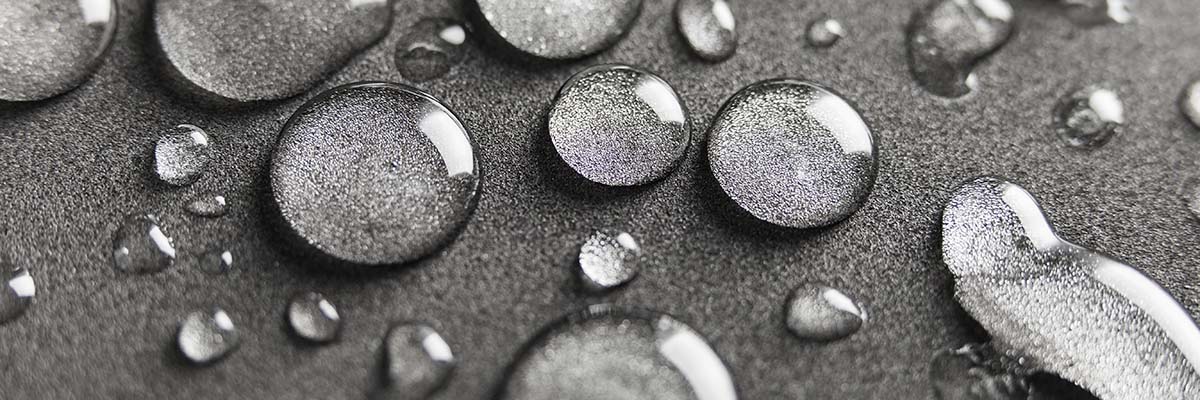
Liquid spills are one of the top threats to polished concrete floors, so it is important to do your best to address any spills as soon as you notice them. Grease and oil spills are also particularly damaging to polished concrete. Promptly cleaning up spills is essential, as standing liquids can etch through/penetrate surface polish and leave unattractive stains on your polished concrete flooring.
Spills from acidic liquids are especially important to clean up as soon as they happen. This is because acidity easily penetrates polished concrete surfaces. Soft drinks, milk, fruit juices, vinegar, and even some condiments have a high potential to damage your flooring if left to sit. They can leave nasty stains that are impossible to remove yourself, typically requiring professional maintenance to repair. However, even leaving water or cleaning products sitting can also be very damaging, so keep an eye out for those spills too!
After cleaning up spilled liquid, gently wipe or mop the area with water and a small amount of neutral-pH cleaner to ensure there is no residue remaining on the floor. For tougher spills like oil and grease, an oil and grease remover can be used.
Just like liquid spills, small particles of grit can also ruin the appearance of your polished concrete flooring over time. This is because the grit is abrasive and will scratch the floor's protective coating, reducing lustre and increasing susceptibility to stains and other damage.
To avoid damage from grit, polished concrete flooring should be dry mopped with a microfibre cleaning pad or swept with a fine bristle broom at the end of every day (and throughout the day for very high-traffic areas). Be sure to remove as much dirt and debris as possible before wet mopping with an automatic scrubber.
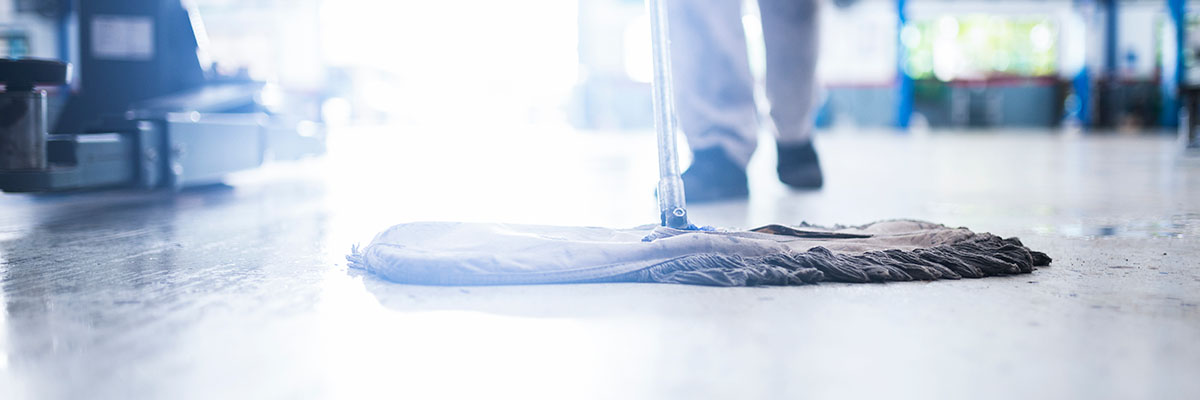
Like daily maintenance for polished concrete flooring, weekly care is not extensive. However, it is very important and should never be skipped. While daily cleaning can keep everything looking tidy and reduce the potential of damage from spills and grit, it is not enough to keep polished concrete floors clean and shiny.
Throughout the week, grime will inevitably build up on your floors from foot traffic and your daily operations. Therefore, weekly wet mopping with a non-abrasive, automatic scrubber and neutral-pH floor cleaner is required to lift grime and kill bacteria.
Before conducting your weekly wet mopping, ensure that your polished concrete flooring is thoroughly dry-mopped. Small, gritty particles underneath an automatic scrubber can damage the polished sheen of your flooring. So, pay extra attention to sweeping on your weekly maintenance days.
To reduce the need for frequent repolishing and refinishing (and to avoid more extensive polished concrete repair), there are a few common mistakes to avoid when cleaning polished concrete flooring, including:
Not using walk-off mats
Using aggressive scrubbers
Cleaning with water only
Scratching the surface finish with stiff bristle brooms and brushes
Using acidic detergents with hydroxides or sulphates that etch the surface.
Applying your own floor waxes, finishes, and sealers
Allowing spills or cleaning products to sit on the surface.
Rushing the cleaning process
Not working in smaller batches
Now that you are aware of polished concrete maintenance dos and don’ts, be sure to use walk-off mats to prevent the likelihood of damage from wet boots and sandy or muddy shoes. Avoid abrasive scrubbers or harsh cleaning agents, clean up spills as soon as possible, and don’t rush the cleaning process whenever possible.
Avoiding the most common mistakes and being proactive will maximize the shine and longevity of your polished concrete floors and keep them functional and attractive for many years to come.
Even if you have a perfect polished concrete maintenance record, you should plan to review the conditions of your flooring on a yearly basis. This will help you proactively identify early signs of permanent staining, loss of gloss, or other damage that may require support from flooring experts.
In most cases, polished concrete restoration and refinishing will only be required every two to three years. However, with a meticulous daily and weekly cleaning protocol, many polished concrete flooring finishes can last for up to five years before polishing is recommended for ideal appearance and lustre. On the other hand, polished concrete refinishing for high-traffic areas may be more frequent due to increased wear and tear.
When polished concrete restoration or refinishing is required, you can expect concrete flooring experts, like BNE, to use water-based stripping agents to remove dirt and debris. They will then restore floor colour and shine, followed by the application of floor protectants and densifiers.
Damage beyond regular wear and tear may require polished concrete repair. A qualified expert concrete flooring contractor, like BNE, can assess the damage in your space if necessary and make recommendations as required.
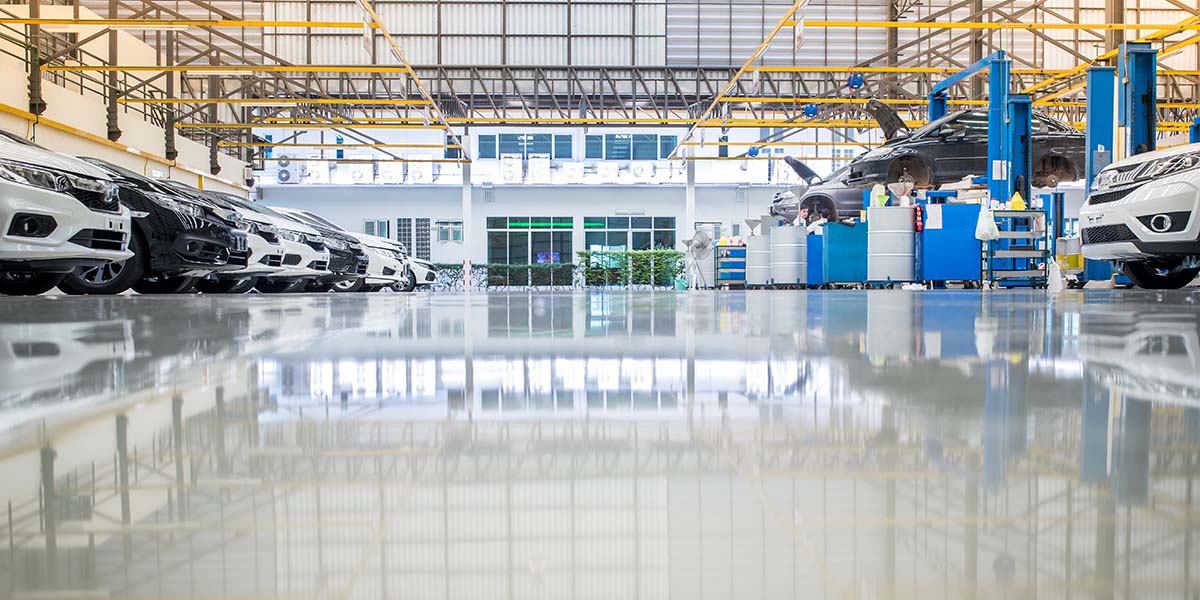
In conclusion, polished concrete flooring is an ideal flooring solution for commercial spaces. It is a top flooring choice for retail stores, warehouses, showrooms, event venues, and office spaces due to its attractive appearance, durability, and low maintenance cleaning requirements.
While polished concrete flooring maintenance is minimal; the daily, and weekly cleaning protocols are essential. Regular cleaning is critical for reducing stains and damage that will require professional polished concrete restoration or repair. Dedicated regular cleaning practices also help reduce wear and tear on polished concrete's protective coatings that are responsible for overall lustre.
Daily cleaning requirements include dry mopping and cleaning up any spills as soon as you notice them. Weekly polished concrete care includes dry mopping, cleaning up spills, and wet mopping with an automatic scrubber and neutral-ph floor cleaner. Avoid rushing the cleaning process, using acidic cleaning agents, and scrubbing with abrasive cleaning pads.
On a yearly basis, assess your floors for damage, staining, or gloss reduction. If needed, call in your local polished concrete flooring expert (like BNE) to help you keep your venue and your flooring looking its best!
Are you exploring flooring options for your commercial space? Or are you ready to install a polished concrete floor and seeking experts you can rely on? Then BNE is ready to speak with you about your upcoming flooring project! We are happy to offer our expertise to ensure you find the best flooring solution for your unique needs.
At BNE, we are proud to be an industry leader in polished concrete, coatings, and concrete surface preparation. We have over 25 years of experience working with contractors, architects, property managers, designers, and facility owners in all major industries.
From your initial consultation to the final installation, we make concrete floors and the flooring experience better. From start to finish, you can trust that your project is in extremely capable hands! Contact us today to speak to one of our sales representatives!

